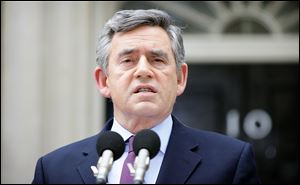
British prime minister to resign
5/11/2010
David Cameron, delivering his winner's speech in his Witney constituency in Oxfordshire, is courting the Liberal Democrats to join his Conservatives in a coalition government.
Kirsty Wigglesworth / AP
LONDON - British Prime Minister Gordon Brown said yesterday he would step down this year, sacrificing himself to give his Labour Party a chance to form a government with the smaller Liberal Democrats.
The Liberal Dems are already being courted by David Cameron's Conservatives, who won the most seats in a parliamentary election last week but fell short of a majority.
The Conservatives shot back after Mr. Brown's statement with their own "final offer" to the Liberal Dems, an invitation to include them in a formal coalition and the promise of a referendum on a limited reform of the voting system. That is a key issue for the Liberal Democrats.
Labour, in power since 1997, finished second in the election and the Liberal Democrats, led by Nick Clegg, were a distant third. It is the first time since 1974 that a British election has put no party in overall control.
In a solemn statement in front of the prime ministerial residence at 10 Downing Street, Mr. Brown said the Liberal Dems now wanted to talk to Labour in parallel to their ongoing negotiations with the Conservatives.
"As leader of my party, I must accept [the election result] is a judgment on me," he said. "I therefore intend to ask the Labour Party to set in train the processes needed for its own leadership election."
His announcement could make it easier for Labour to lure the Liberal Dems away from the Conservatives, because Mr. Clegg had signalled strongly during the election campaign that he did not wish to keep the unpopular Mr. Brown, 59, in office.

Brown
Mr. Brown did not give a precise time-frame for his departure but said he hoped a new Labour leader would be in place by the time of the annual party conference at the end of September. Foreign Secretary David Miliband, the bookmakers' favorite to replace Mr. Brown, said no potential candidate would start campaigning for the job until talks on forming a new government were over.
Mr. Clegg said that in the absence of an agreement, it was in the national interest for the Liberal Dems to talk with both Labour and the Conservatives.
Either choice is fraught with difficulties for Mr. Clegg. The election gave the Conservatives a more convincing mandate than Labour's, but the Liberal Dems and the Conservatives are far apart on many key issues.
On the other hand, keeping Labour in power after its poor election result would be awkward for the Liberal Dems. Even combined, the two parties would still fall short of a majority and would require support from small nationalist parties.